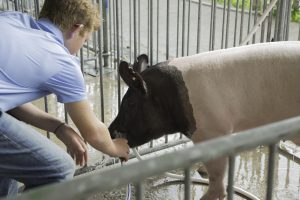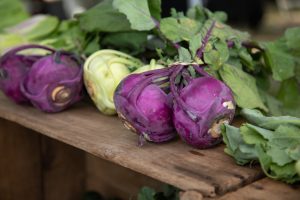DOVER, Del. — The countdown is on for many Delaware youth and adult exhibitors as they get ready to showcase their agricultural exhibits at this year’s Delaware State Fair. Along with rides, food, and games, the state fair is a great opportunity for fair-goers to learn more about agriculture – Delaware’s top industry.
 “By far, Delaware has one of the best fairs in the United States and with each year it only gets better. I encourage everyone to join our staff to celebrate the history and the accomplishments of 100th Delaware State Fair,” said Secretary of Agriculture Michael T. Scuse. “This is an opportunity for Delawareans and visitors to learn about Delaware agriculture and all it does for our consumers and our economy. Take time to walk through the livestock barns to see the wide variety of animals that our young people are showing. Take time to ask questions and learn where your food comes from. Getting to see a dairy cow up close helps make the connection that milk comes from a cow.”
“By far, Delaware has one of the best fairs in the United States and with each year it only gets better. I encourage everyone to join our staff to celebrate the history and the accomplishments of 100th Delaware State Fair,” said Secretary of Agriculture Michael T. Scuse. “This is an opportunity for Delawareans and visitors to learn about Delaware agriculture and all it does for our consumers and our economy. Take time to walk through the livestock barns to see the wide variety of animals that our young people are showing. Take time to ask questions and learn where your food comes from. Getting to see a dairy cow up close helps make the connection that milk comes from a cow.”
More than ninety-nine percent of Delaware’s 2,300 farms are family-owned. Delaware farmers produce a variety of agricultural products on more than 525,000 acres of farmland, including corn, soybeans, wheat, poultry and livestock, and fruits and vegetables. All of the state’s agricultural commodities can be experienced simply by visiting the barns and buildings along Holloway Street, from the front of the Fair by Quillen Arena all the way back to the 4-H/FFA Building (The Centre) and The Delmarva Building.
“We are excited to bring a new educational experience for visitors in the Department’s Agriculture Commodities and Education Building. So many people do not understand that their food really begins its journey on a family farm ─ not in the grocery store.” said DDA spokesperson Stacey Hofmann. “We have a really vibrant display that’s larger than life that will help start the conversation about how food gets from the farm to the table – whether your 5, 50, or 100.”
If you love trivia, the Delaware Department of Agriculture’s Farms and Food game show is always a hit. Loaded with brand-new questions, bring your family and friends by the Delaware Agriculture Commodities and Education to have fun testing your Delaware agriculture knowledge.
Educational demonstrations will be held at 1 p.m. and 3 p.m. from the first day of fair, through the last Friday. Topics include:
• Thursday, July 18: Utopia Fruita Snacks for All; One Health: How the Health of Humans, Animals and the Environment are Interconnected
• Friday, July 19: Drying Herbs; Dish on Delmarva Poultry
• Saturday, July 20: Making Straw Bracelets; Watermelon Demo
• Sunday, July 21: Butter Churning; Cooking with Honey
• Monday, July 22: Worm Composting; Bee Talk
• Tuesday, July 23: Is It a Wasp or A Bee?; Watermelon Demo
• Wednesday, July 24: Heat to Toe Avocado Show; LeadDelaware Class 5
• Thursday, July 25: Trees are Terrific; Dish on Delmarva Poultry
• Friday, July 26: Butter Churning; Honey Extraction
This year, Delaware’s Department of Agriculture, Delaware’s Division of Public Health, and Delaware’s Division of Fish and Wildlife are teaming up during State Fair to educate the public about rabies prevention. There will be a hands-on educational exhibit in the Delaware Agriculture Commodities and Education Building the last five days, as well as the presentation “One Health: How the Health of Humans, Animals and the Environment are Interconnected” on Thursday, July 18 at 3 o’clock in the afternoon.
Rabies is an infectious disease affecting the nervous system of humans and other mammals. Rabies is endemic to the East Coast, but it has become more of an issue as development encroaches on the habitat of wild animals. Infection can occur through the bite or scratch of an infected animal or if saliva from such an animal gets into the eyes, nose, mouth or an opening in the skin. Fortunately, rabies is also almost completely preventable.
“In the past, when wild animals got rabies, they would typically die and no one would really know about it because they were in their own habitat. Every once in a while, a rabid animal would come in contact with a pet or person, and then the individual would go through the series of rabies shots or a pet would be quarantined,” said Dr. Karen Lopez, Deputy State Veterinarian. “But today, these animals are making it into our developments more frequently because we are now living in their backyard. Typical animal behavior is no longer present when a wild or stray domestic animal is infected with rabies. We want to make sure owners are vaccinating their pets, horses, and livestock. It is also important for everyone to know what to do if they get bitten or scratched by an animal capable of carrying rabies. If transmission does occur, rabies is considered a fatal disease.”
On the grounds, fairgoers can travel back in time and revisit the history of Delaware agriculture through the Antique Machinery Showcase held on July 20 in the Quillen Arena. This event features antiques dating back to the early 1900s, and even some before then. With antique tractors, broom makers, craftsmen, and more, there is something for all ages to experience.
Attendees can also get a glimpse of the equine industry throughout Fair. Exhibitors will be participating in English and Western classes, showmanship, showing horses in hand, and driving. Harrington Raceway is one of three tracks in Delaware that offers horse racing. On Thursday, July 25, fair-goers are invited to attend harness racing in the M&T Bank Grandstand with a 7 p.m. post time. With approximately $600,000 in total purses, the race program will be headlined by four $100,000 Delaware Standardbred Breeders Fund final events for 3-year-olds as well as program staples like the Governor’s Cup, which features some of Delaware’s top horses, ages three years and older. Governor John Carney will be on hand to present the trophy to the winner.
###
Media Contact: Stacey Hofmann, 302-698-4542, stacey.hofmann@delaware.gov
 “By far, Delaware has one of the best fairs in the United States and with each year it only gets better. I encourage everyone to join our staff to celebrate the history and the accomplishments of 100th Delaware State Fair,” said Secretary of Agriculture Michael T. Scuse. “This is an opportunity for Delawareans and visitors to learn about Delaware agriculture and all it does for our consumers and our economy. Take time to walk through the livestock barns to see the wide variety of animals that our young people are showing. Take time to ask questions and learn where your food comes from. Getting to see a dairy cow up close helps make the connection that milk comes from a cow.”
“By far, Delaware has one of the best fairs in the United States and with each year it only gets better. I encourage everyone to join our staff to celebrate the history and the accomplishments of 100th Delaware State Fair,” said Secretary of Agriculture Michael T. Scuse. “This is an opportunity for Delawareans and visitors to learn about Delaware agriculture and all it does for our consumers and our economy. Take time to walk through the livestock barns to see the wide variety of animals that our young people are showing. Take time to ask questions and learn where your food comes from. Getting to see a dairy cow up close helps make the connection that milk comes from a cow.” Rehoboth Beach, Del. – Delaware Grown Week – a campaign highlighting the fruits, vegetables, and value-added agricultural products produced in The First State – officially launched with a kick-off event at the Rehoboth Beach Farmers’ Market including Secretary of Agriculture Michael T. Scuse, state legislators, and other officials.
Rehoboth Beach, Del. – Delaware Grown Week – a campaign highlighting the fruits, vegetables, and value-added agricultural products produced in The First State – officially launched with a kick-off event at the Rehoboth Beach Farmers’ Market including Secretary of Agriculture Michael T. Scuse, state legislators, and other officials. “We know consumers – both Delawareans and visitors to our state– are seeking out local food options because they are more and more interested in where their food is produced. Having an array of locally grown, fresh in-season produce encourages consumers to try new fruits and vegetables and eat healthy,” said Delaware Secretary of Agriculture Michael T. Scuse. “With the kickoff of Delaware Grown Week today, I am pleased to announce the release of the new Delaware Grown website. Through the use of an interactive map,
“We know consumers – both Delawareans and visitors to our state– are seeking out local food options because they are more and more interested in where their food is produced. Having an array of locally grown, fresh in-season produce encourages consumers to try new fruits and vegetables and eat healthy,” said Delaware Secretary of Agriculture Michael T. Scuse. “With the kickoff of Delaware Grown Week today, I am pleased to announce the release of the new Delaware Grown website. Through the use of an interactive map,